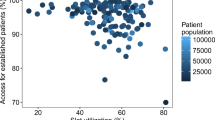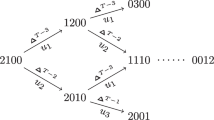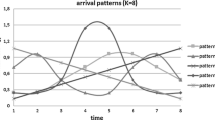Abstract
Managing an efficient outpatient clinic can often be complicated by significant no-show rates and escalating appointment lead times. One method that has been proposed for avoiding the wasted capacity due to no-shows is called open or advanced access. The essence of open access is “do today’s demand today”. We develop a Markov Decision Process (MDP) model that demonstrates that a short booking window does significantly better than open access. We analyze a number of scenarios that explore the trade-off between patient-related measures (lead times) and physician- or system-related measures (revenue, overtime and idle time). Through simulation, we demonstrate that, over a wide variety of potential scenarios and clinics, the MDP policy does as well or better than open access in terms of minimizing costs (or maximizing profits) as well as providing more consistent throughput.




Similar content being viewed by others
References
Butler K, Stephens M (1993) Distribution of a sum of binomial random variables. Technical report No 457 for the Office of Naval Research. Available at http://www.dtic.mil/cgi-bin/GetTRDoc?AD=ADA266969&Location=U2&doc=GetTRDoc%.pdf
Cayirli T, Veral E (2003) Outpatient scheduling in health care: a review of literature. Prod Oper Manag 12:519–549
Gallucci G, Swartz W, Hackerman F (2005) Impact of the wait for an initial appointment on the rate of kept appointments at a mental health center. Psychiatr Serv 56:344–346
Gupta D, Wang L (2008) Revenue management for a primary-care clinic in the presence of patient choice. Oper Res 56:576–592
Kim S, Giachetti R (2006) A stochastic mathematical appointment overbooking model for healthcare providers to improve profits. IEEE Trans Syst Man Cybern Part A Syst Humans 36:1211–1219
Kopach R et al (2007) Effects of clinical characteristics on successfull open access scheduling. Health Care Manage Sci 10:111–124
LaGanga L, Lawrence S (2007) Clinic overbooking to improve patient access and increase provider productivity. Decis Sci 38:251–276
Lee V, Earnest A, Chen M, Krishnan B (2005) Predictors of failed attendances in a multi-specialty outpatient centre using electronic databases. BMC Health Serv Res 5:1–8
Liu N, Ziya S, Kulkarni V (2009) Dynamic scheduling of outpatient appointments under patient no-shows and cancellations. Manuf Serv Oper Manag 12:347–364
Murray M, Tantau C (1999) Redefining open access to primary care. Manag Care Q 7:45–51
Muthuraman K, Lawley M (2008) A stochastic overbooking model for outpatient clnical scheduling with no-shows. IIE Trans 40:820–837
Robinson L, Chen R (2009) Traditional and open-access appointment scheduling policies: The effects of patient no-shows. Manuf Serv Oper Manag 12:330–346
Zeng B, Turkcan A, Lin J, Lawley M (2009) Clinic scheduling models with overbooking for patients with heterogeneous no-show probabilities. Ann Oper Res 178:121–144
Acknowledgements
This work was funded in part by a research grant from National Science and Engineering Research Council (NSERC). I would like to thank Martin Puterman from the University of British Columbia his help in revising this paper.
Author information
Authors and Affiliations
Corresponding author
Rights and permissions
About this article
Cite this article
Patrick, J. A Markov decision model for determining optimal outpatient scheduling. Health Care Manag Sci 15, 91–102 (2012). https://doi.org/10.1007/s10729-011-9185-4
Received:
Accepted:
Published:
Issue Date:
DOI: https://doi.org/10.1007/s10729-011-9185-4




